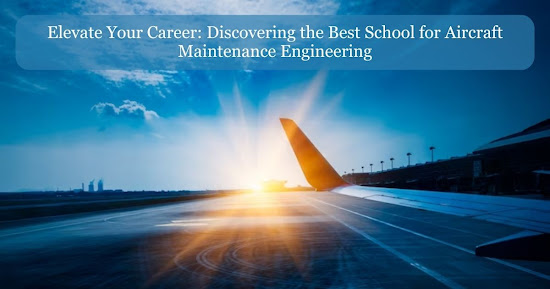Elevate Your Career: Discovering the Best School for Aircraft Maintenance Engineering

The world of aviation is a captivating realm, where dreams of soaring through the skies become a reality. If you've ever envisioned being an integral part of this dynamic industry, pursuing a career in aircraft maintenance engineering might just be your ticket to success. But with numerous options available, how do you find the best school to kickstart your journey into the world of aircraft maintenance engineering? In this comprehensive guide, we'll walk you through the process of discovering the perfect school for your aspirations.
The Significance of Choosing the Right School
Selecting the right school for your aircraft maintenance engineering education is a crucial decision that can significantly impact your future career. It's more than just choosing an institution; it's about laying the foundation for your expertise, gaining practical skills, and ensuring a seamless transition into the industry. Let's delve into the key factors that can help you make an informed choice.
1. Accreditation and Reputation
Start by researching schools that are accredited by aviation regulatory bodies and recognized by industry professionals. Accreditation ensures that the school adheres to rigorous standards of education and training. Additionally, consider the reputation of the school within the aviation community. A school with a strong reputation often has well-established connections with airlines, maintenance organizations, and aviation companies, which can greatly benefit your career prospects.
2. Comprehensive Curriculum
The heart of any aircraft maintenance engineering program is its curriculum. Look for schools that offer a well-rounded and comprehensive curriculum that covers all aspects of aircraft maintenance, from fundamental principles to advanced technologies. A program that blends theoretical knowledge with hands-on experience in real-world scenarios can provide you with a solid foundation.
3. Experienced Faculty
The expertise of the faculty members can significantly impact your learning experience. Experienced instructors who have worked in the aviation industry bring real-world insights into the classroom. They can provide valuable anecdotes, practical tips, and industry connections that enhance your learning journey.
4. State-of-the-Art Facilities
Aircraft maintenance engineering requires practical training in a controlled environment. Check whether the school has modern facilities, including workshops, hangars, and labs equipped with the latest tools and equipment. Practical training in a simulated environment can prepare you for the challenges you'll face on the job.
5. Industry Partnerships and Internships
Schools that have established partnerships with airlines, aircraft manufacturers, and maintenance organizations often offer internship opportunities. Internships not only provide you with hands-on experience but also allow you to network with industry professionals and potentially secure job offers upon graduation.
6. Alumni Success Stories
The success of a school's alumni can be a testament to the quality of education it provides. Look for schools that proudly showcase their graduates' achievements in various sectors of the aviation industry. Alumni who hold prominent positions in airlines, maintenance organizations, and regulatory bodies reflect the school's commitment to producing capable professionals.
7. Support Services
A supportive learning environment can make a significant difference in your educational journey. Check if the school offers career counseling, job placement assistance, and academic support services. These resources can help you excel academically and transition smoothly into your career.
8. Location
Consider the location of the school. Ideally, you'd want to study in an area with a strong aviation presence, as it can provide you with ample opportunities for internships, networking, and exposure to industry events.
9. Student Feedback and Reviews
Online platforms, social media, and forums often contain valuable insights from current and past students. Reading reviews and testimonials can give you a glimpse into the student experience, faculty interactions, and overall satisfaction with the program.
10. Alumni Network
A strong alumni network can offer ongoing support throughout your career. It provides a platform for networking, mentorship, and staying updated on industry trends.
Finding the Right Fit: Research and Visits
To find the best school for aircraft maintenance engineering, invest time in thorough research. Compile a list of potential schools, and delve into their websites, brochures, and prospectuses to gather detailed information about their programs. Many schools also offer campus tours and open houses, which can provide an opportunity to interact with faculty, tour facilities, and get a feel for the campus environment.
A Closer Look at Course Details
While choosing a school, remember that the quality of the aircraft maintenance engineering course details matters just as much as the institution itself. A robust curriculum can provide you with the knowledge and skills required for a successful career. Let's take a closer look at what a typical aircraft maintenance engineering course might include:
1. Basic Aircraft Systems: Gain an understanding of the fundamental systems that make an aircraft function, including airframe, engines, avionics, and more.
2. Maintenance Practices: Learn about maintenance procedures, inspections, troubleshooting, and repairs for various aircraft components.
3. Regulations and Safety: Explore aviation regulations, safety protocols, and compliance with industry standards to ensure aircraft airworthiness.
4. Propulsion Systems: Delve into the intricacies of aircraft engines, including maintenance, repair, and overhaul techniques.
5. Avionics and Electronics: Understand the electronic systems that control an aircraft's navigation, communication, and monitoring.
6. Human Factors: Explore the human element of aircraft maintenance, focusing on factors that influence performance, safety, and decision-making.
7. Practical Training: Engage in hands-on training, practicing maintenance procedures on real aircraft or high-fidelity simulators.
8. Internships and Work Experience: Many programs offer internships or work placements that provide valuable practical experience in real aviation settings.
In Conclusion
Embarking on a career in aircraft maintenance engineering is an exciting and promising endeavor. Choosing the right school and understanding the intricacies of the course details can set you on a path to aviation success. Remember to consider factors such as accreditation, reputation, curriculum, faculty expertise, facilities, and industry connections. As you navigate through various options, envision yourself in a classroom or hangar, equipped with the knowledge and skills to maintain and ensure the safety of aircraft.
Elevate your career by discovering the best school for aircraft maintenance engineering—a decision that can shape your trajectory in the aviation industry and propel you toward a sky-high future. It's not just a choice; it's an investment in your passion and aspirations. So take flight into a world of opportunities, where your journey starts with the perfect school and an unwavering commitment to excellence in aircraft maintenance engineering.



Comments
Post a Comment